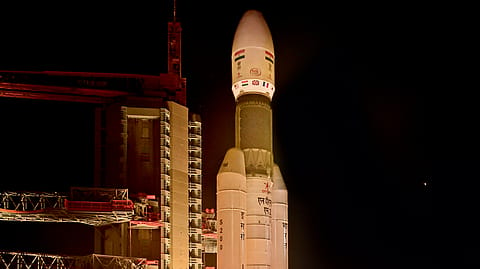Budget 2024: Space sector calls for PLI, tax exemptions, startup fund
Indian Space Association (ISpA) wants the government to draw inspiration from the PLI scheme for drones and introduce a similar scheme for space-grade components.

From tax sops to production linked incentives (PLI) to startup funds, India’s fast growing space sector industry is pegging its hopes on sector-friendly announcements in Union Budget 2024.
Industry associations representing the sector point out that such measures are critical to strengthen sustainability and competitive edge of stakeholders in the space industry, including startups, MSMEs and SMEs.
Indian Space Association (ISpA), the industry association representing private space companies in the country, wants the government to draw inspiration from the PLI scheme for drones and introduce a similar scheme for space-grade components. Such a scheme will incentivise domestic manufacturing under the ‘Make in India’ vision and bolster the supply chain for space-related technologies and attract investment by providing financial incentives to manufacturers based on their output, ISpA states.
Another industry body SatCom Industry Association (SIA-India) seeks substantial increase in India's space budget to align with global top space-faring nations, alongside dedicated funds for local manufacturing and capability building. The association also stresses on ‘Government procurements’ to ensure fair access and competition, with long-term purchase agreements to stabilise demand. Collaboration between government and private sectors is crucial for expanding satellite capacities, including initiatives like BharatKaSatcom with GSAT-20 and promoting satellite communication technologies through incentivised adoption and investment in infrastructure, SIA-India say.
“Building on the successes of ISRO's Chandrayaan and Adithya missions, and the impactful milestones achieved by private sector launch companies, the space sector is gaining confidence, especially with FDI liberalisation. However, as a sunrise industry, more demand generation from the government is essential to drive non-linear growth”, Arpan Sahoo, Co-founder and Chief Operating Officer of Bengaluru based startup KaleidEO Space Systems says.
According to SIA-India, the government should announce extensive funding programmes for deep-tech space startups, modelled after IDEx (Innovations for Defence Excellence), along with interest rate subsidies for startup loans to enhance affordability. SIA-India also recommends the creation of targeted tax incentives and investment-friendly policies to stimulate private sector participation in high-risk ventures related to deep tech R&D. It proposes an extension of the tax holiday period for deep tech startups to at least seven years.
“The Budget should prioritise measures to propel the Commercial Space Sector, with focus on nurturing deeptech space startups. Increased funding is crucial, aligning India's space budget with global standards. Tax incentives, interest rate subsidies, and collaborative frameworks between academic institutions and startups are essential to foster innovation, in line with Prime Minister Modi’s vision of 'Sabka Prayas'," says Subba Rao Pavuluri, president, SIA-India.
Recommended Stories
Meanwhile ISpA has called for expansion of GST to critical components of satellites, ground systems, and launch vehicles etc., introduction of tax holidays and exemptions for space sector firms to stimulate growth within the space sector, reduction of tax-rate on Interest on foreign borrowings and reduced withholding tax for satellite sector.
"We believe that India's focus on innovation and favourable regulatory environment will draw significant foreign direct investment, boosting economic growth and unlocking the $44 billion opportunity, driving unprecedented economic progress and prosperity. With the implementation of the above reforms and initiatives, ISpA expects that enhanced investment and technological advancements will drive innovation, fostering a robust ecosystem for startups and established companies of the space industry. The prompt implementation of the Space Activities Act is crucial for addressing legal and standards related issues, providing a clear regulatory framework for the industry," says Lt. Gen. A.K. Bhatt (Retd.), director general, ISpA.